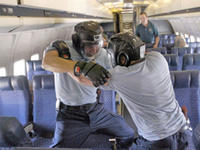-
Wastewater recycling adds to greenhouse gas emissions

New research shows that wastewater recycling processes may generate more greenhouse gases than traditional water-treatment processes; still, there are good reasons to continue keep wastewater recycling among the water-resource tools for urban areas
-
-
Identifying bad guys in a crowd
New CCTV technology aims to do two things: for post-incident forensic analysis the system retraces a person’s steps after they have left a site; and for real-time analysis the system alerts security to immediate or imminent threats; researchers say the technology will also address privacy concerns: if a computer could automatically detect and preserve footage “of interest,” the images of the rest of the people captured by CCTVs can be safely deleted, minimizing the invasion to privacy
-
-
San Antonio’s "Piracy King" pleads guilty
Police in San Antonio recently put an end to the “Piracy King’s” reign; last Thursday, Ernest Christopher Smith, nicknamed the piracy king by local law enforcement officials because of the large number of fake DVDs he sold at local flea markets, pleaded guilty to trafficking in counterfeit goods.
-
-
New training facility features simulated bus, air, and rail stations

On Tuesday DHS Secretary Janet Napolitano was in Brunswick, Georgia for the grand opening of a sophisticated new $5.3 million counter-terrorism training center for law enforcement officials; the 22,000 square-foot facility features several simulation areas including a mock bus terminal, subway station, and an airport terminal
-
-
Quake disrupts East Coast cell service

Tuesday’s 5.9 magnitude earthquake that struck Virginia and could be felt across the northeast, exposed continuing weaknesses in U.S. emergency communications networks; residents in the northeast experienced difficulty making calls on their cell phones, despite no reported damage to communications infrastructure
-
-
Union Pacific settles drug fines, invests $50M in border security
Railroad giant Union Pacific Corp. agreed last week to invest $50 million to help protect the U.S.-Mexico border and to improve supply chain security; the announcement comes as the settlement of an ongoing dispute between the railroad company and U.S. border officials over nearly $500 million in fines
-
-
Detroit police to stop responding to unverified burglar alarms
As of Monday, 22 August, the Detroit police department will no longer respond to burglar alarms unless security companies can verify the need for an officer; the policy is aimed at reducing the number of false alarms and allowing officers more time to focus on critical duties; more than 98 percent of all burglar alarms are false alarms; critics of the new policy fear that it will exacerbate safety conditions in a city already plagued by crime and slow police response times
-
-
Sector Report for Tuesday, 23 August 2011: Law Enforcement Technology
This report contains the following stories.
Plus 1 additional story.
-
-
Combating tech-fueled flash mobs a new problem for police
With the help of cell phones and social networking sites, spontaneous swarms of youths have rushed into convenience stores or assaulted bystanders in a rash of “flash mobs” across the United States; law enforcement officials are struggling to find a way to effectively combat this new phenomenon which does not impede on privacy rights
-
-
New FBI app helps parents and police find missing children
The FBI has released its first mobile application aimed at helping parents locate their children when they go missing the Child ID app allows parents to electronically store photos and other vital information so that they will be able to provide law enforcement with critical details in a timely fashion if their child goes missing
-
-
"Cop shops" in Texas help fight apartment crime
Residents in Texas apartment complexes have begun dedicating entire units to police officers so they have a place to rest, take a break, and fill out reports; the cop shops help minimize crime by keeping officers in parts of town where their presence is needed
-
-
Water mist puts out fires at low pressure
A new water mist system allows for fires to be extinguished from a distance of eight meters; the system’s special nozzles generate a fine mist of tiny water droplets; the water and the propellant nitrogen are non-hazardous, environmentally friendly, and leave no residues
-
-
Antenna-equipped garments here
To make communications devices more reliable, researchers are working on incorporating radio antennas directly into clothing, using plastic film and metallic thread; the new antenna design has a range four times larger than that of a conventional antenna worn on the body — one that is used by American soldiers today
-
-
Columbine lessons helped thwart Tampa school tragedy

Police, having learnt the lessons of the 1999 Columbine High School massacre in Colorado, was in a better position to prevent violence in Tampa, Florida, last week; many school districts have threat assessment teams to try to connect the dots if there is a troubled, and potentially violent, student in their mix
-
-
Researchers developing graffiti analysis app
Law enforcement officials could soon have an app for their mobile phones that allows them to snap a picture of gang graffiti and have its meaning translated; gangs often use graffiti as a way of communicating messages like challenges or warnings to rival gangs and understanding its meaning could help fight crime
-
More headlines
The long view
Why Was Pacific Northwest Home to So Many Serial Killers?
Ted Bundy, Gary Ridgway, George Russell, Israel Keyes, and Robert Lee Yates were serial killers who grew up in the Pacific Northwest in the shadow of smelters which spewed plumes of lead, arsenic, and cadmium into the air. As a young man, Charles Manson spent ten years at a nearby prison, where lead has seeped into the soil. The idea of a correlation between early exposure to lead and higher crime rates is not new. Fraser doesn’t explicitly support the lead-crime hypothesis, but in a nimble, haunting narrative, she argues that the connections between an unfettered pollution and violent crime warrant scrutiny.
Bookshelf: Smartphones Shape War in Hyperconnected World
The smartphone is helping to shape the conduct and representation of contemporary war. A new book argues that as an operative device, the smartphone is now “being used as a central weapon of war.”
